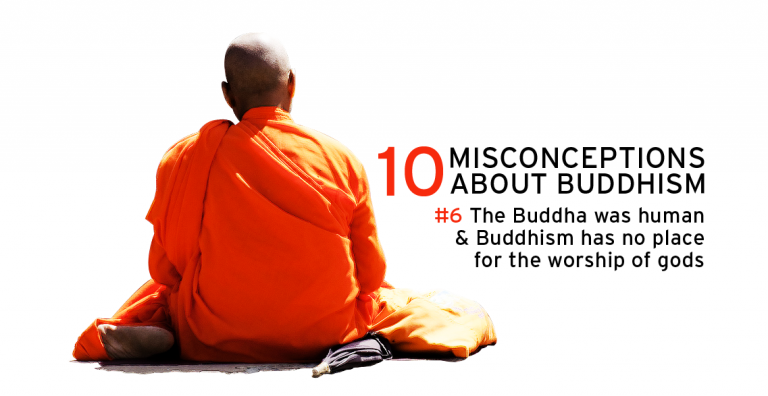Buddhism is famous in the West as an “atheistic religion,” in the sense that, unlike the Abrahamic religions of Judaism, Christianity, and Islam, it does not recognize a single creator deity. However, one should not assume from this that Buddhism has no gods. It has not one, but many.
In traditional Buddhist cosmology, the gods—or deva in Sanskrit, a cognate of “divinity”—are distributed among 27 heavens (svarga): six are located in the sensuous realm (kamadhatu) along the slopes, at the summit, and in the air above Mount Sumeru, the mountain at the center of the world; 17 in the meditation heavens of the realm of subtle materiality (rupadhatu); and four are in the immaterial realm (arupyadhatu), where there is no form, only consciousness. Because each of these heavens is located within samsara, the realm of rebirth, none of these heavens is a permanent abode of the gods who live there, and none of the gods is eternal.
Related: The Meaning of Nirvana in Buddhism Explained
Rebirth as a god is based on virtuous actions performed in a previous life, and when the god’s lifespan is over, the being is reborn some place else. Thus, no god in Buddhism has the omniscience, the omnipotence, or the omnipresence of God in the Abrahamic religions. This does not mean, however, that gods have no powers. They have powers far beyond those of humans. And over the long history of Buddhism, Buddhists, including monks and nuns, have propitiated various gods for blessings and boons. A substantial part of tantric practice, for example, is devoted to inviting gods into one’s presence, making offerings to them, and then requesting the bestowal of various powers (siddhi).
What then is the status of the Buddha? Technically, he is a human, among the five other rebirth destinies (sadgati) in samsara: gods, demigods, animals, ghosts, and denizens of hell. But he is unlike any other human, both in his relation to the gods and in his physical and mental qualities.
In his penultimate lifetime, the Buddha-to-be was a god, abiding, where all future buddhas abide, in the Tushita heaven. It was from there that he surveyed the world, and chose the place of his final birth, his caste, his clan, and his parents. After his enlightenment, the Buddha spent 49 days in contemplation in the vicinity of the Bodhi Tree, concluding, the story goes, that what he had understood was too profound for others to understand, and thus futile to try to teach to anyone.
Related: Who is the Buddha?
The most powerful of the gods, Brahma, descended from his heaven to implore the Buddha to teach, arguing that although many might not be able to understand, there were some with “little dust in their eyes” who would. This is an important moment because it makes clear that the Buddha knew something that the gods did not, and that the gods had been waiting for a new buddha to appear in the world to teach them the path to freedom from rebirth, even from rebirth in heaven. For this reason, one of the epithets of the Buddha is devatideva—“god above the gods.”
Although a human, the Buddha has a body unlike any other. It is adorned with the 32 marks of a superman (mahapurusalaksana), such as images of wheels on the palms of his hands and soles of his feet, a bump on the top of his head, 40 teeth, and a circle of hair between his eyes that emits beams of light. Some of the marks are characteristics found in animals rather than humans: webbed fingers and toes like a duck’s, arms that extend below the knees like an ape’s, and a penis that retracts into body like a horse’s. His mind knows all of his past lives and the past lives of all beings in the universe. In fact, he is omniscient (although the various Buddhist schools have different ideas about exactly what this means).
Even in the early tradition, it is said that he can live for an eon or until the end of the eon, if he is asked to do so. And in the Lotus Sutra it says that his lifespan is immeasurable. He can go anywhere in the universe. He can perform all manner of miracles.
Did he create the universe? No. Is he omniscient? Yes. Is he omnipotent? It depends on what you mean. Is he eternal? Sort of. Is he God? You decide.
[This story was first published in 2014]
Thank you for subscribing to Tricycle! As a nonprofit, we depend on readers like you to keep Buddhist teachings and practices widely available.
